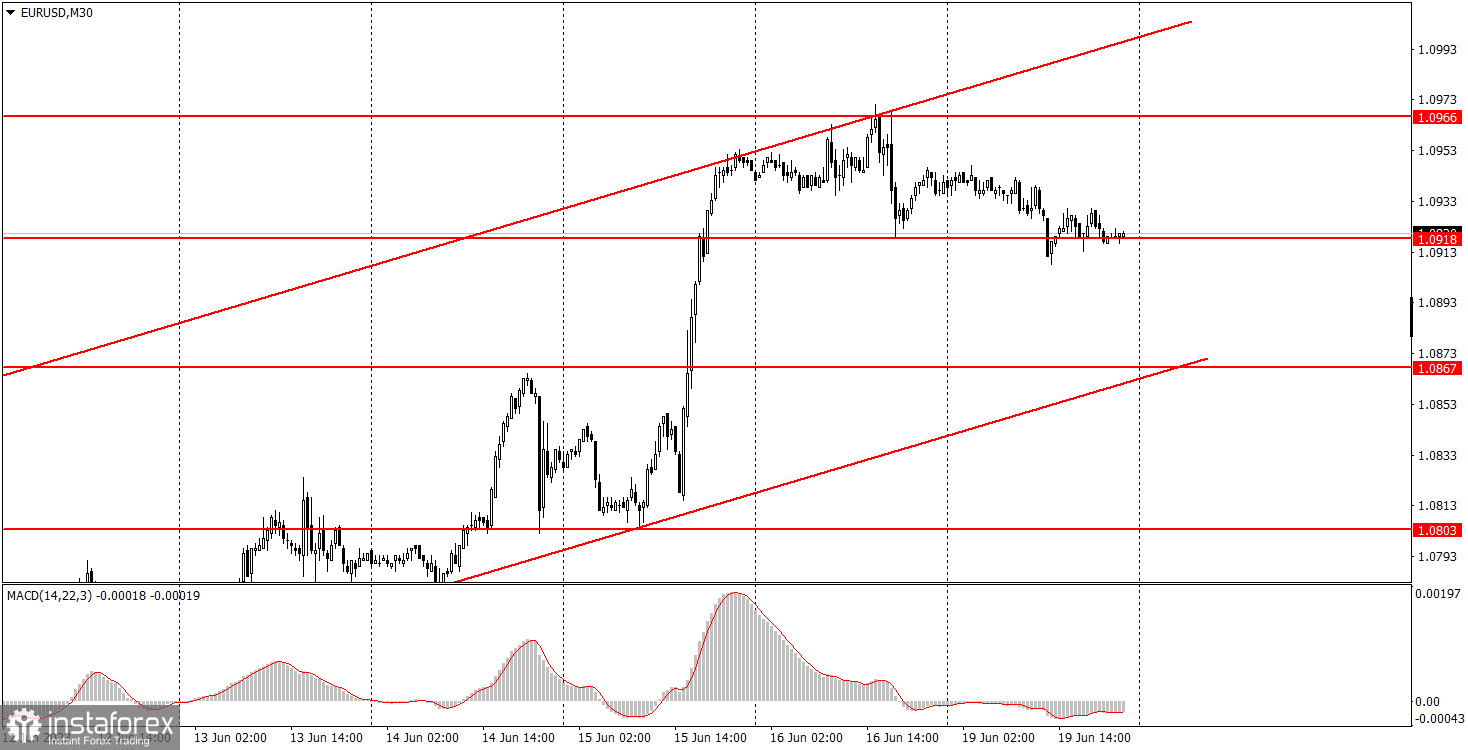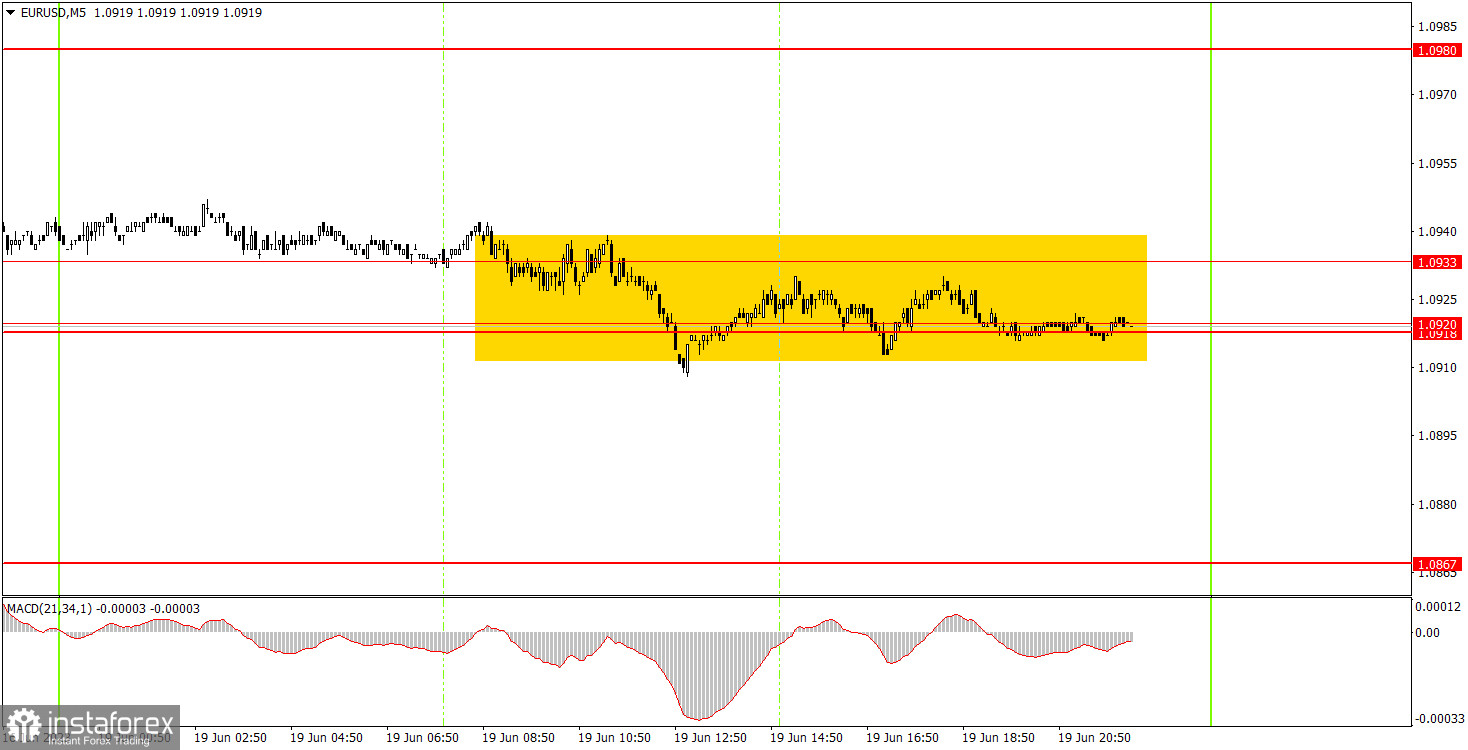Analyzing Monday's trades:
EUR/USD on 30M chart

EUR/USD showed extremely weak movements on Monday. Volatility was low, showing only about 39 pips. Trading was quite challenging and even meaningless due to such low volatility, even on lower time frames. During periods of low volatility, it makes sense to hold a trade for several days to have the opportunity to profit from it. Therefore, trading should shift to higher time frames. However, we already warned you not to expect much from Monday. There was no macroeconomic background in both the United States and the European Union. The speeches by Luis de Guindos, Isabel Schnabel, and Philip Lane did not provide any new information to the market, resulting in no market reaction. The pair remains within an ascending channel and may enter correction for a couple more days.
EUR/USD on 5M chart

On the 5-minute chart, you can also clearly see that EUR/USD has been moving mostly sideways all day long. Therefore, there was no point in entering the market. In addition, the price spent the entire day in the range of 1.0918-1.0933. Hence, there were no trading signals. The pair only managed to settle below the mentioned range in the middle of the European trading session, which beginners could interpret as a sell signal. However, we did not see any significant growth or fall by the end of the day. This trade could have been closed anywhere with minimal losses.
Trading tips on Tuesday:
On the 30M chart, the pair continues to follow an uptrend. In the medium term, we expect the euro to fall again, but it may take quite a long time before the downtrend returns to the market. The ascending channel now determines the trend and could signal its possible break. The key levels on the 5M chart are 1.0607-1.0613, 1.0673, 1.0733, 1.0761, 1.0803, 1.0857-1.0867, 1.0918-1.0933, 1.0980, 1.1038. A stop loss can be set at a breakeven point as soon as the price moves 15 pips in the right direction. On Tuesday, several speeches by ECB policymakers (including de Guindos) will take place in the European Union, and representatives of the Federal Reserve (particularly Bullard) in the United States. No important economic data.
Basic trading rules:
1) The strength of the signal depends on the time period during which the signal was formed (a rebound or a break). The shorter this period, the stronger the signal.
2) If two or more trades were opened at some level following false signals, i.e. those signals that did not lead the price to Take Profit level or the nearest target levels, then any consequent signals near this level should be ignored.
3) During the flat trend, any currency pair may form a lot of false signals or do not produce any signals at all. In any case, the flat trend is not the best condition for trading.
4) Trades are opened in the time period between the beginning of the European session and until the middle of the American one when all deals should be closed manually.
5) We can pay attention to the MACD signals in the 30M time frame only if there is good volatility and a definite trend confirmed by a trend line or a trend channel.
6) If two key levels are too close to each other (about 5-15 pips), then this is a support or resistance area.
How to read charts:
Support and Resistance price levels can serve as targets when buying or selling. You can place Take Profit levels near them.
Red lines are channels or trend lines that display the current trend and show which direction is better to trade.
MACD indicator (14,22,3) is a histogram and a signal line showing when it is better to enter the market when they cross. This indicator is better to be used in combination with trend channels or trend lines.
Important speeches and reports that are always reflected in the economic calendars can greatly influence the movement of a currency pair. Therefore, during such events, it is recommended to trade as carefully as possible or exit the market in order to avoid a sharp price reversal against the previous movement.
Beginners should remember that every trade cannot be profitable. The development of a reliable strategy and money management are the key to success in trading over a long period of time.





















